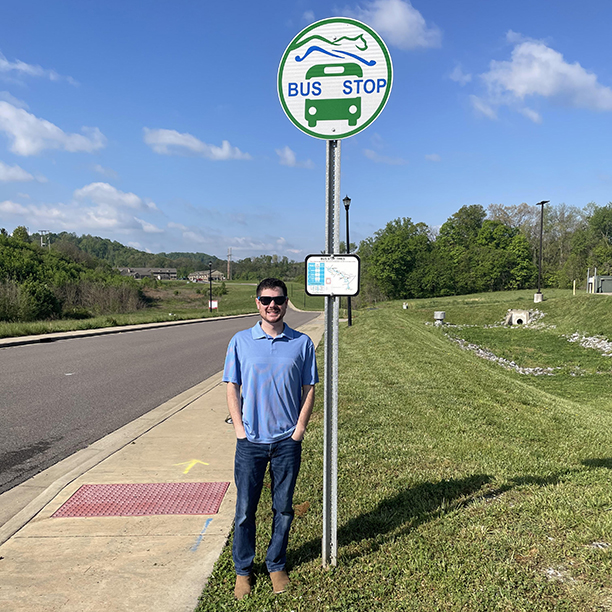From the classroom to the community

KINGSPORT (June 1, 2021) – An assignment in a class at East Tennessee State University turned into an opportunity for Kingsport native and nursing student Aaron “Max” Chesser to advocate for additional seating options and sheltered coverings at Kingsport area bus stops.
During the spring semester, Chesser was enrolled in ETSU’s “Community and Public Nursing” course, taught by Dr. Cindy Phillips. In this class, Phillips requires students to complete a “windshield survey,” in which they conduct an informal survey of people in an environment or community of interest. Usually these reports are used by health care professionals to propose a targeted plan of improvement for something the community needs or wants to improve upon.
“This is an important assignment for nursing students because it gives them the opportunity to critically evaluate communities and things that impact the health of communities they live in,” Phillips said. “Students tend to focus on health care, but this literally takes them outside the proverbial box and lets them evaluate businesses, construction, food sources, schools, transportation, health care access and more.”
Chesser, who wants to pursue travel nursing after he graduates from ETSU in December 2021, decided to focus his attention on his hometown.
“My windshield survey allowed for me to dive deeper within the Kingsport community and make organized observations that I never noticed while living there,” Chesser said. “I realized that one way it could improve is by adding more seating options and sheltered coverings at the Kingsport Area Transit Service bus stops.”
He observed that additional shelters and seating could offer physical safety and promote health and wellness by protecting citizens from weather and providing a place of rest for the aging or those with disabilities who are waiting for the bus. He also noted that adding sheltered coverings and seating options could increase community engagement amongst diverse social backgrounds.
As he completed the windshield survey, his observations became more than just an assignment to Chesser.
“After conducting research for the assignment, I learned of all the negative effects that not being able to use public transportation has on the physical and mental health of a person, especially if that person has a disability,” he said. “I also thought about how I would feel if I saw a loved one sitting on a curb in the rain with a handful of groceries waiting for a bus, and that was very upsetting to me. Many people who use public transportation have a disability and can feel vulnerable at times, so I thought this could be one way of showing them that they matter, and they aren’t alone.”
So after he presented the assignment to his class, Chesser decided to find out if he could do more. A graduate of Dobyns-Bennett High School, he reached out to a former teacher to find out the best contacts with whom he could share his research. Through this contact, he was invited to present his findings to the Kingsport Neighborhood Commission.
On April 29, Chesser was invited to present to the commission and to the transit planner of the Kingsport Area Transit Service. As a result, a Kingsport alderman asked Chesser to send his presentation so that she could present it to the Kingsport City Manager and to other community leaders.
“We look forward to meeting with Mr. Chesser regarding the services we provide,” said Chris Campbell, Kingsport Area Transit Service (KATS) Public Transportation manager. “Additionally, we appreciate his interest in helping the community and increasing personal independence. Mr. Chesser’s observations regarding seating and shelters coincides with a transit study recently completed by Jarrett Walker and Associates reviewing KATS’ efficiency and connectivity. This plan shows that there are considerable tradeoffs that transit network design requires when determining the best way to reach and serve the most people.”
Chesser was excited to learn that KATS will soon have new technology on board each bus that will report where riders get on board, are dropped off, what the peak times of travel are, and provide real time vehicle capacity. This information will give planners more robust information about how the system is used and where to strategically place new investments.
Currently, there is money budgeted for new passenger stops and benches, Campbell added. The locations will be selected using the new ridership data. The two newest shelters were placed in April 2021 as part of the Stone Drive sidewalk project.
In addition, Campbell pointed out that KATS takes great pride in helping individuals obtain and sustain their independence through the fixed route bus service and Dial A Ride van services. Through partnerships with state, federal, and local agencies, KATS is able to offer these services to individuals with disabilities, senior citizens, people with health issues, those needing transportation to their jobs, and others who choose to utilize KATS out of personal preference.
“It was so inspiring to see how quickly and compassionately the Kingsport community leaders were willing to help me in this process,” Chesser said. “I’m very optimistic and could not thank the ETSU College of Nursing and the many Kingsport community leaders enough for their support in my efforts to improve the accessibility of the Kingsport Area Transit Service.”
Phillips said it is gratifying to see Chesser take what he learned from his windshield survey to try to make a difference in his community.
“Max’s presentation was exceptional; he’s an excellent student, and we are very proud of him,” Phillips said.
To learn more about KATS services, please visit www.kingsporttransit.org. To learn more about the ETSU College of Nursing, visit etsu.edu/nursing.
 Stout Drive Road Closure
Stout Drive Road Closure